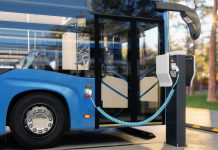A recent report from Shell and Deloitte, ‘Navigating Fleet Decarbonisation: A Guide to Driving a Successful Transition’, highlights the importance of electric vehicles (EVs) as a route to decarbonisation for fleets everywhere, but how straightforward is the transition?
A recent report from Shell and Deloitte, ‘Navigating Fleet Decarbonisation: A Guide to Driving a Successful Transition’, highlights the importance of electric vehicles (EVs) as a route to decarbonisation for fleets everywhere. Fleet owners agree, with 95% viewing EVs as the long-term solution for their organisation. (1)
However, making the transition is often easier said than done. With frameworks, contracts and processes to adhere to, migrating public sector fleet vehicles to low-and zero-carbon solutions can be a lengthy process that requires advanced planning.
So, how can fleet operators simplify the process and take important steps towards their net-zero goals?
Electrification offers the main route to fleet decarbonisation
It’s no surprise that most fleet operators surveyed by Shell and Deloitte consider EVs as the long-term solution for their organisation. The report also contains a comparison of the different fuel types, including petrol, hybrid electric vehicles (HEV) and battery electric vehicles (BEVs). And the analysis concludes that EVs currently offer a clear route for fleets to achieve net-zero emissions.
Where internal combustion engine (ICE) vehicles powered by petrol, diesel or biofuels continue to impact clean air policies, battery electric vehicles (BEVs) can deliver zero-emission transport when charged with energy from renewable sources. Even hybrid electric vehicles (HEVs) and plug-in hybrid vehicles (PHEVs) have limited capability to ensure zero tailpipe emissions.
And, when measured against other lower-emission options like hydrogen fuel-cell electric vehicles (FCEVs), currently, BEVs are the only solution likely to offer the availability and infrastructure needed to drive adoption among all vehicles primarily used by public sector fleets.
Procurement processes add to the transition challenge
While EVs represent a likely future for many fleets, market challenges still exist. These include the availability of vehicle models in the market, the cost of electrification, access to charging infrastructure (both on-the-go and the viability of charging solutions for the workplace) and how to assess the suitability of EVs for different organisations and needs.
What makes this more complex for public sector organisations are the additional barriers to adoption they face. Frameworks simplify the process of finding suppliers who can meet the UK’s public sector procurement regulations. However, with many supplier agreements lasting several years, existing contracts may largely focus on the needs of an ICE fleet. This means organisations aren’t always sure they’ll comply with the framework by adding additional EV solutions to their requirements.
Without the ability to easily manage EV charging access and payments, the business case for adopting EVs becomes less compelling – and public sector fleets can find themselves falling behind on decarbonisation.
Finding the right supplier can unlock vital opportunities for change
Despite the focus on ICE vehicles, there are still ways for public sector organisations to pursue decarbonisation solutions through procurement frameworks. To drive progress on electrification while remaining compliant, fleet operators should look to:
• Work with a supplier who can deliver EV charging alongside conventional fuel payments
Electrifying your fleet is a gradual process – and many organisations will find themselves managing a mixed fleet of ICE and electric vehicles. Working with a partner within your framework who offers a hybrid card to manage fuel and electric charging payments is an effective way to reduce the complexity of electrification.
• Redefine ‘network’ coverage
When choosing your preferred suppliers, ensure they have a growing network of EV charge points (combining its own stations with those of third parties) in addition to refuelling stations. Be sure as well to look for a partner with the expertise to help you assess your potential for workplace charging solutions – to supplement on-the-go charging and ensure your fleet is fully supported.
• Work with a supplier who can support the wider EV transition
Making the switch to EVs won’t happen overnight. So, it’s important to lay the groundwork for the transition while implementing other emission reduction initiatives. You should look for suppliers who can add to fuel cards with solutions and services that support elements like route optimisation, depot charging, and mobile fuel delivery – all while helping you to take the no-regret actions that prepare your fleet for wider electrification.
The procurement conversation might start with conventional fuel payments, but it doesn’t have to end there. Fleet operators can use digital solutions, such as telematics, to help them advance their electrification journey.
Also, it’s not simply a case of moving to EVs as quickly as possible. It’s important to explore what can be achieved now while developing a plan for wider change that’s built around each organisation’s specific needs.
Working closely with all stakeholders to deliver success
Fleet decarbonisation is complex and requires internal alignment across key stakeholders to create a tailored strategy that not only balances business priorities, cost savings and efficiency with decarbonisation but is genuinely attainable for their business.
That’s why it’s vital to find partners who take the time to fully understand an organisation’s requirements before using their expertise and experience to develop a tailored plan for decarbonisation success. A plan that considers unique factors, such as contracts and organisational pressures, while offering solutions to drive short- and long-term progress.
Shell Fleet Solutions works closely with partners and customers to overcome their challenges and support the wider EV transition – combining consultancy with end-to-end digital solutions and services tailored to meet each fleet’s specific needs.
Discover more about how to navigate fleet decarbonisation in the latest report from Shell and Deloitte here. And get in touch with us to discuss your specific fleet decarbonisation needs: Request a call-back.
Sources
1. Shell, Deloitte. “Navigating Fleet Decarbonisation: A Guide to Driving a Successful Transition.” 2022

This work is licensed under Creative Commons Attribution-NonCommercial-NoDerivatives 4.0 International.











